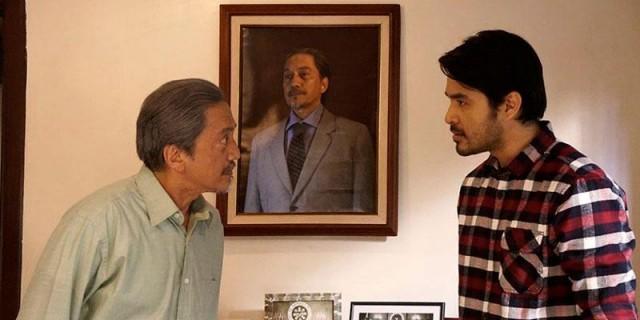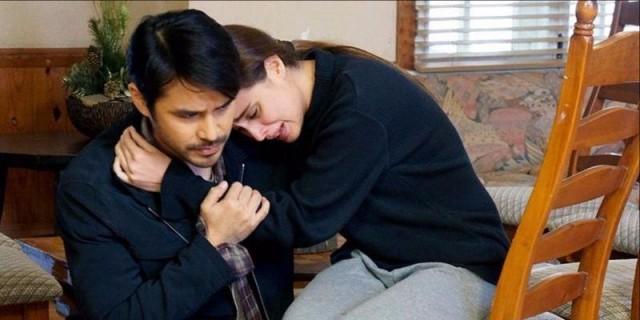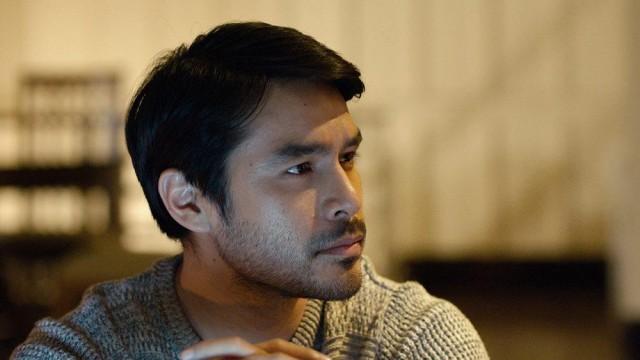'Citizen Jake': Brave but unrealized
What commends this comeback film by Mike de Leon best is the earnestness and courage of its story, which is as ambitious as it is grand: a ‘taking stock’ as well as an ‘analysis’ of what ails us a nation, which is the avarice, iniquity, immorality, and hypocrisy of the elites that have ruled, despoiled, ravaged, and run it to the ground, from Marcosian to the present times.
This project can be a handful for even the most inveterate storyteller, and this is arguably why very few have dared to take it on. What’s mostly done, even or especially in the recent harvest of filmic narratives that have emerged out of the independent cinema movement, is something that gestures toward the enormity of the problem, but grounds itself most resolutely in a mere synecdoche of it: the neorealist portrait of the poor’s remaindered lives, as evidenced dramatically in the story of one or two memorable protagonists.
This is not what "Citizen Jake" wants to do, however. As has been the consensus of reviewers, this film dares to take the problem by its horns, and proposes the intimate story of a troubled political dynasty — a father and his sons — in order to begin to understand its complexity.
Jake is the younger of two sons of a preeminent senior senator, and what immediately makes him interesting is that he is unlike his father and congressman brother, who are both incorrigibly corrupt.
We are given the ‘inner portrait’ of Jake by way of flashbacks to his happier years as a young boy, who loved and was preferentially loved by his anguished mother. The father’s political career can be traced back to the Marcos dictatorship, and like many others of his ilk — cronies and lackeys — he survived the demise of this regime by banking on the country’s short memory, and because — and this is the film’s deepest sorrow — in the aftermath of this regime the structures of impunity never really got dismantled, but became even more entrenched and merely passed from one set of elite hands to another.

Jake is exceptional in that he’s a truth-seeking and staunchly moral journalist-blogger, who finds his family’s ways rather sordid and ignoble, and would gladly turn his back completely on his father and brother if only they would leave him be, and let him keep the Baguio house that his miserable mother had loved and repaired to, right before she ran away and abandoned her insufferable husband and their children.
Here he decides to live in a household that’s being looked after by an elderly servant couple and their son (a Wright Park “pony boy” who’s been Jake’s friend since childhood), has a long-term but complicated relationship going with a colleague at the university where he teaches, and gets embroiled in an investigative story about a brutally murdered female student.
This is a story that, he discovers soon enough, intimately involves his father, who schemed this very ‘discovery’ in order to morally implicate and rope him in: an epiphany that clarifies to him how the deaths of the woebegone student and his childhood friend are merely collateral damage in his father’s — which is to say, the elite-dominated system’s — unremitting cupidity and hunger for more and more power and wealth.
Allusions to Marcosian despotism abound in this allegory — as photographic snippets from recent events, as well as nightmarish images of the deposed revenant’s grotesque and mountain-bound bust.
These drive home the point of the film’s perfervid conviction: that the systematization of this form of social and governmental evil was ‘perfected’ by this dispensation, and that its life in our national reality is far from superseded, for as reincarnated in the current administration it may be seen to be as hale and hearty as ever.
As avowed intention and as germinal idea all this is well and good, and given the current exigencies, entirely welcome and necessary: in the interest of our people’s urgent and unfinished political education, doubtless local audiences do need to see more and more ‘filmizations’ of our increasingly difficult social reality, especially when these seek to expose the structures that at once condition and perpetuate it.
But a film is not its idea or its concept, and this is where the problem with "Citizen Jake" all too visibly lies: early on, with what increasingly becomes a pedantic (and ill-advised) use of a metacinematic narrator, the film’s thesis slowly but surely comes to overwhelm its narrative, its form and medium as art, which simply do not get ‘shaped’ and realized enough.
The human drama that the film’s premise promised — of at last catching a glimpse of and possibly understanding the ‘interiority’ of our country’s ruling elite — was sadly unfulfilled, primarily because its characters are not quite real or ‘round’ enough.
They are politicians, and so should be shown as largely having political discussions, right? As we know, to such a query the indirection that is art’s preferred procedure would typically answer, not necessarily. Actually, it’s precisely when politicians are not being political that their ‘truths’ can best be laid bare, for at the end of the day who are they as persons, really? What are they like when they’re alone, what are their frustrations, what constitutes their inmost affliction and happiness, what do they dream or fantasize about?
In the same way that the best neorealist films about our country’s abject poor treat their poverty as paradoxically incidental to their truths as complex persons (with their own inalienable dignity), the rich may best be understood in a similarly nuanced and tangential fashion.
As fictionists and filmmakers know, to recognize complexity in characters is a very basic requirement of the dramatic form, and sadly, what’s all too clear is that this film’s script shirks this responsibility in favor of promoting its fiery and single-minded polemics.
Jake’s character is the protagonist of this film, and simply because he may be found in almost every other scene he’s ostensibly ‘rounder’ than everybody else. But still, the question of how he could have ended up being so different from his family is left quizzically and disappointingly unanswered, even by film’s end.
The loving but problematic relationship he has with (the memory of) his mother simply does not suffice, primarily because this is not quite dramatized and is mostly merely stated (incidentally, this is a mother who left her family and remarried in the States, after she decided that she couldn’t stand her husband anymore, for reasons that aren’t entirely clear or believable, either).
Other than the awkward use of a narrator, the false notes and infelicitous turns in the script manifest themselves early on, when we hear the emotionally illogical or falsely histrionic and soap-opera-inspired dialogue between Jake and his girlfriend— a relationship that’s certainly not helped any by the obvious lack of onscreen ‘connection’ between the ill-equipped actors playing them, who often come across as looking much too self-conscious and visibly uncomfortable to be remotely convincing.

And so, yes, this also needs to be said: the performances of the leads in this film are lamentably weak, and part of the reason must be their being greenhorns on one hand, and the weakness of the script that they had to work with on the other, with its mannered dialogue and perfunctory attempts at characterization.
Because they exist merely to serve as illustrations in a morality play whose conclusion is, right from the get go, mostly foregone, none of the characters become dramatically ‘real’ in this film: not the iniquitous masters, not the devoted servants, not the long-suffering mother, and yes, sadly, not the winsome and honorable hero either, whose journey of discovery (of his family’s thoroughly dark ‘nature’) seems incredible and irrelevant, simply because by turning him into a detached and preachy commentator the script decided rather early on that he’s never really been a part of it.
Nonetheless, it bears repeating that, on a ‘philosophical’ level, "Citizen Jake" is indubitably interesting, for it dares to train the cinematic gaze on the moral dissonance not of our society’s ‘have-nots’, but rather—for a change—of its ‘haves’.
As we know, Brockan neorealism and its contemporary practitioners have routinely depicted the blissful and paradoxical coexistence of ‘contradictory’ values in the lives of our nation’s teeming poor, the ‘violation’ of whose ‘codes’ of avowed morality renders them cinematically exotic on one hand, and finally (and painfully) understandable and human on the other.
Among other things such ‘filmizations’ generally propose the understanding that the poor in our midst do what they must do—profess and even preach one thing, and practice another—in order simply to survive.
Without such a ‘rationale’, what indeed might account for the im- or amorality of our country’s ruling classes? The answer of "Citizen Jake" to this question isn’t entirely apparent, even as it (self-righteously) points an accusing finger at the deeply ingrained habits of our country’s heinous political system.
This doesn’t answer the question completely, because Jake’s character himself bids us to wonder how despite being raised in and benefiting from such a system, he could’ve snapped so definitively out of it.
And yes, his being an internet journalist doesn’t help solve the picture’s riddle and merely oversimplifies things, for it idealizes (hyper)media as a space uncontaminated by this system, one of whose enticements is, as we know, egomaniacal self-aggrandizement (a contagion that, clearly, the upsurge in information technology has spread to epidemic proportions in our time).
Just now, it occurs to us that a possible insight that the film unwittingly gestures toward lies in its few unrelated scenes that show libraries and books—Jake’s, the school’s, and the concupiscent, indiscreet, and blackmailed judge’s. And that insight is this: literacy, and how precarious and uneven it continues to be, in our culture.
As has been argued by historians and anthropologists, print literacy has, to a large extent, been the cognitive condition of national possibility for most if not all present-day countries, and it has everything to do with the crucial role that the imaginative faculty plays in enabling empathy and fraternal identification across the cultural and personal diversity that any national community must, by definition, summarize and contain.

The allegorizing of such differences into a national unity is only possible through the categorical mentality, abstraction, and psychodynamics occasioned by immersion in the printed word, which is also the medium in which the foundational texts of any modern nation—Constitutions, national novels, national epics, etc.—is couched.
The claim that we remain enduringly oral — and therefore provisional, situational, and clan-oriented — as a people isn’t exactly a controversial one, and yet not enough attention (cinematic or otherwise) has been given to this fact, this cultural condition, that may very well explain why our sociopolitical structures as well as our social relations are the way that they are.
While copious and valuable in its own tactile and immediate ways, the oral mind —with its makeshift and negotiable predisposition — has prevented us from remembering analytically and tenaciously about things. Sadly, this is precisely the kind of cognitive skill that we need in order to set a-right so much of what is wrong about our national reality, blighted as it is by exactly the kinds of clientelist ties —premised on personalistic logic—that orality propagates and requires.
Needless to say, it’s only with a firmly established textual mentality that many of our enduring problems as a country can begin to be addressed, for their solutions all presuppose, in its citizens primarily, the ability—actually, the habit—to think in categorical rather than provisional terms.
We need to realize that it is especially through literacy’s mindful and imaginative acts that an ethical intuition can take root. Democratic ideals are, in principle, all premised on empathy, which is best nourished through immersion in the slow and painstaking ‘soul-work’ of reading and writing.
Indeed, it would be supremely interesting if a film about our ‘educated’ classes, in its quest to understand their ‘interiority’, were to inquire into the quality of their imaginative faculty and consequently their empathy—in other words, the depth or degree (actually, the superficiality or paucity) of their literacy…
Instead of a telenovela-aspiring narrative with a visually prepossessing and popularity-inclined blogger as the central character, how might a film like this have turned out if its vision and ‘rhythm’ had been more indie-modest and ‘indwelling’, indirect but closely observed, and its protagonist had been a relatively well-off, inwardly tormented, socially misunderstood, and visionary poet? (sadly, in this film, the minor and obligatory ‘poet figure’ is merely tacked on and ornamental).
Still and all, we do need to state the obvious, at the end of things: whatever else we may say about it, what this film happily announces is that its beloved and much-missed maker has returned from his self-imposed exile, at last.
Forget Jake. Now that Mike’s back, we wait with bated breath. — LA, GMA News



